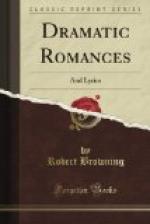XVIII
“We withstood Christ then? Be mindful how
At least we withstand Barabbas now!
Was our outrage sore? But the worst we spared,
To have called these—Christians, had we
dared!
Let defiance to them pay mistrust of Thee,
And Rome make amends for Calvary!
XIX
“By the torture, prolonged from age to age,
By the infamy, Israel’s heritage,
110
By the Ghetto’s plague, by the garb’s
disgrace,
By the badge of shame, by the felon’s place,
By the branding-tool, the bloody whip,
And the summons to Christian fellowship,—
XX
“We boast our proof that at least the Jew
Would wrest Christ’s name from the Devil’s
crew.
Thy face took never so deep a shade
But we fought them in it, God our aid!
A trophy to bear, as we march, thy band,
South, East, and on to the Pleasant Land!”
120
[Pope Gregory XVI abolished this bad business of the Sermon. —R. B.]
Notes: “Holy-Cross Day” reflects the attitude of the corrupt mediaeval Christians and Jews toward each other. The prose preceding the poem gives the point of view of an imaginary Bishop’s Secretary, who congratulates himself upon the good work the Church is doing in forcing its doctrine on the Jews in the Holy-Cross Day sermon, and effecting many conversions. The poem shows that the Jews regard this solicitude on the part of the Christians with hatred and scorn, and that their conversions are in derision of their would-be converters. The sarcasm of the speaker reaches a pinnacle of bitterness when he accuses the Christian bishops of being men he had helped to their sins and who now help him to their God. From scorn toward such followers of Christ, he passes, in the contemplation of Rabbi Ben Ezra’s death song, to a defence of Christ against these followers who profess but do not act his precepts, and a hope that if the Jews were mistaken in not accepting Christ, the tortures they now suffer will be received as expiation for their sin.
Holy-Cross Day is September 14. The discovery of the true cross by Saint Helen inaugurated the festival, celebrated both by Latins and Greeks as early as the fifth or sixth century, under the title of the Exaltation of the Cross and later in commemoration of the alleged miraculous appearance of the Cross to Constantine in the sky at midday. Though the particular incidents of the poem are not historical, it is a fact (see Milman’s “History of the Jews’’) that, by a Papal Bull issued by Gregory XIII in 1584, all Jews above the age of twelve years were compelled to listen every week to a sermon from a Christian priest.
52. Corso: a street in Rome
67. Rabbi Ben Ezra: or Ibn Ezra, a mediaeval Jewish writer and thinker, born in Toledo, near the end of the eleventh century.




